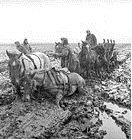Mike29
Posts: 368
Joined: 9/10/2011
Status: offline

|
quote:
ORIGINAL: elxaime
I don't want to minimize or excuse the culpability of Hitler and Stalin for their evil. However the politics of this era were complicated. We should try to avoid falling too early into seeing this through the lens of the Cold War. At that time, the political divisions of Europe following World War One were still relatively fresh. For example:
- the prior year 1938 German annexation of Czechoslovakia also featured Polish and Hungarian land grabs of Czechoslovak territory, as well as the creation of the Slovak State (since recreated and now an EU member); the area of Czechoslovakia taken by Poland had a Polish minority
- the main Polish areas being claimed by the Soviet Union had existed as part of the Russian Czarist Empire for centuries. It is not hard to imagine, had the Russian Monarchy still existed, seeing France and Britain giving guarantees to the Czar for these lands. Certainly, the West did not go to war for Polish nationalism in 1914
- the Polish eastern regions were also subject to other nationalist claims. In 1919, the new Poland had fought not only the Bolshevists, but also the Lithuanians. Parts of 1939 Poland included lands taken from Lithuania in a plebiscite the Lithuanians had never recognized (Poland had issued an ultimatum to Lithuania in 1938). Newly-incorporated areas with ethnic Ukrainian majorities had to reluctantly be given local autonomy. The 1939 Polish state, like its German and Russian neighbors, envisioned itself as a multiethnic but caused tension by promoting the Polish language and culture over others
- For their part, prior to their own extinguishing, the Czechoslovak government had supported revision of the German-Polish frontiers and resisted Polish attempts to form an alliance (French attempts to form an alliance of the smaller Eastern European states during this time also failed)
In the churning environment following the collapse of the German, Russian and Hapsburg Monarchies, might was often right. Hitler, of course, took this to its most evil and genocidal and Stalin was not far behind. But even the smaller nations carried their own sets of brass knuckles around and didn't hesitate to use them on those perceived as weaker than they.
History has tended to brush these complexities under the rug. The most obvious example was a memorial I saw in Romania to their World War Two war dead. The dates on the memorial were 1944-45, leaving out the hundreds of thousands of casualties suffered when Romania was allied to Germany (the Japanese are hardly the only ones who practice historical revisionism).
Exactly true. Except this.
quote:
and Stalin was not far behind
BTW I've been to Museum of war history in Vienna, it has Hall of fame where names of all Austrian fieldmarshals, generals and elder officers lost in action during all wars since I dont remember, may be 1200. So, that list also does not enclude Austrian losses during WW2.
< Message edited by Mike29 -- 11/4/2012 8:48:32 PM >
|
 Printable Version
Printable Version








 Yeah... just twice at least the Russkies have been saved by General Winter. How many times has the weather come to our rescue?....Er, the Spanish Armada and...that's about it.
Yeah... just twice at least the Russkies have been saved by General Winter. How many times has the weather come to our rescue?....Er, the Spanish Armada and...that's about it.


 New Messages
New Messages No New Messages
No New Messages Hot Topic w/ New Messages
Hot Topic w/ New Messages Hot Topic w/o New Messages
Hot Topic w/o New Messages Locked w/ New Messages
Locked w/ New Messages Locked w/o New Messages
Locked w/o New Messages Post New Thread
Post New Thread